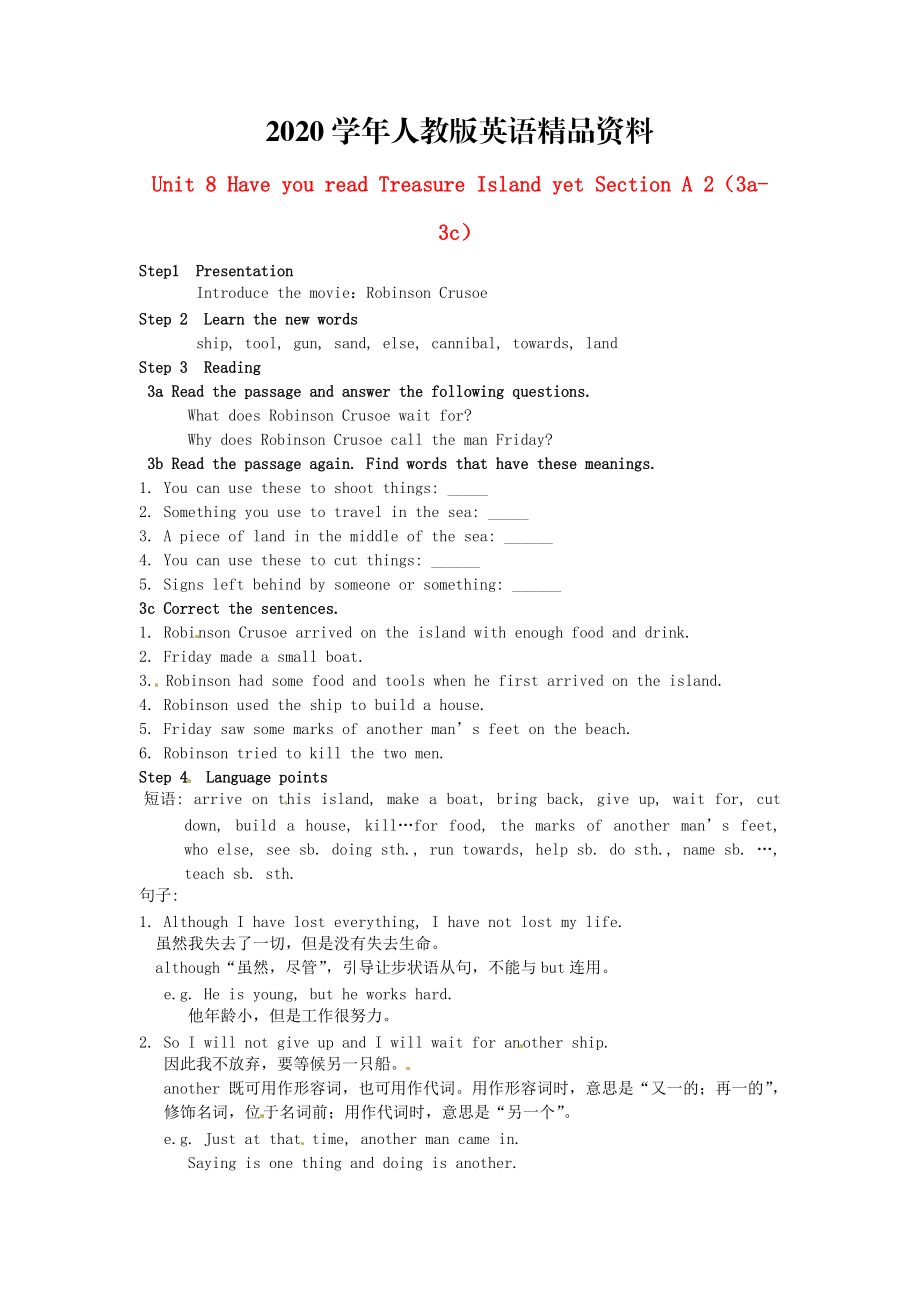《2020【人教版新目標(biāo)】八年級(jí)英語下冊(cè)Unit 8 Have you read Treasure Island yet Section A 23a3c》由會(huì)員分享,可在線閱讀����,更多相關(guān)《2020【人教版新目標(biāo)】八年級(jí)英語下冊(cè)Unit 8 Have you read Treasure Island yet Section A 23a3c(2頁珍藏版)》請(qǐng)?jiān)谘b配圖網(wǎng)上搜索。
1���、2020學(xué)年人教版英語精品資料
Unit 8 Have you read Treasure Island yet Section A 2(3a-3c)
Step1 Presentation
Introduce the movie:Robinson Crusoe
Step 2 Learn the new words
ship, tool, gun, sand, else, cannibal, towards, land
Step 3 Reading
3a Read the passage and answer the following questions
2�����、.
What does Robinson Crusoe wait for?
Why does Robinson Crusoe call the man Friday?
3b Read the passage again. Find words that have these meanings.
1. You can use these to shoot things: _____
2. Something you use to travel in the sea: _____
3. A piece of land in the middle of the
3�、sea: ______
4. You can use these to cut things: ______
5. Signs left behind by someone or something: ______
3c Correct the sentences.
1. Robinson Crusoe arrived on the island with enough food and drink.
2. Friday made a small boat.
3. Robinson had some food and tools when he first arrived on t
4、he island.
4. Robinson used the ship to build a house.
5. Friday saw some marks of another man’s feet on the beach.
6. Robinson tried to kill the two men.
Step 4 Language points
短語: arrive on this island, make a boat, bring back, give up, wait for, cut down, build a house, kill…for food, the
5���、marks of another man’s feet, who else, see sb. doing sth., run towards, help sb. do sth., name sb. …, teach sb. sth.
句子:
1. Although I have lost everything, I have not lost my life.
雖然我失去了一切���,但是沒有失去生命。
although“雖然����,盡管”,引導(dǎo)讓步狀語從句�,不能與but連用。
e.g. He is young, but he works hard.
他年齡小�����,但是工作很
6��、努力�����。
2. So I will not give up and I will wait for another ship.
因此我不放棄���,要等候另一只船���。
another 既可用作形容詞��,也可用作代詞。用作形容詞時(shí)����,意思是“又一的;再一的”�����,修飾名詞�,位于名詞前;用作代詞時(shí)�����,意思是“另一個(gè)”����。
e.g. Just at that time, another man came in.
Saying is one thing and doing is another.
another還可以和數(shù)詞連用,常放在數(shù)詞的前面���,意為“還��;再����;又”。
e.g. We
7����、need another three man to help do the work.
3. How long have they been here? 你來這兒多久了?
how long 常用于詢問時(shí)間�,意為“多久;多長(zhǎng)時(shí)間”��,與現(xiàn)在完成時(shí)連用���,要求謂語動(dòng)詞必須是延續(xù)性動(dòng)詞����。
e.g. How long have you had the book?
你買這本書多久了����?
4. Not long after that, I saw some cannibals trying to kill two men from a broken ship.
在那之后不久,我
8����、看見一些食人肉質(zhì)在試圖殺死兩個(gè)來自破船上的人�����。
see sb. doing sth.意為“看到某人正在做某事”��,強(qiáng)調(diào)看到的動(dòng)作正在進(jìn)行�����。
e.g. Mary saw him cleaning the classroom.
瑪麗看見他正在打掃教室。
see sb. do sth. 意為“看到某人做了某事”��,強(qiáng)調(diào)看到動(dòng)作的全過程����。
e.g. Mary saw him clean the classroom.
瑪麗看見他打掃教室了。
【運(yùn)用】
將下列漢語句子與英文翻譯相匹配�����。
( ) ① 昨天我看見她正在花園里干活��。
( ) ② 昨天我看見
9����、她在花園里干活了����。
A. I saw her work in the garden yesterday.
B. I saw her working in the garden yesterday.
5. One of them died, but the other ran towards my house.
他們當(dāng)中一個(gè)人死了���,但是另一個(gè)朝我的房子跑來���。
run towards 朝……跑
e.g. He ran towards the station.
他跑著去火車站。
6. I named him Friday because that was the day I met him.
我管他叫Friday因?yàn)槟鞘俏矣鲆娝哪且惶臁?
name作動(dòng)詞����,意為“命名;給……取名”��。固定搭配“name + sb. + 名字”意為“給某人取名為……”����。
e.g. Lucy named her little son David. 露西給她的小兒子取名為戴維。
Step 5 Homework
1. Learn the new words and expressions by heart.
2. Retell the story of Robinson Crusoe.
 2020【人教版新目標(biāo)】八年級(jí)英語下冊(cè)Unit 8 Have you read Treasure Island yet Section A 23a3c
2020【人教版新目標(biāo)】八年級(jí)英語下冊(cè)Unit 8 Have you read Treasure Island yet Section A 23a3c

